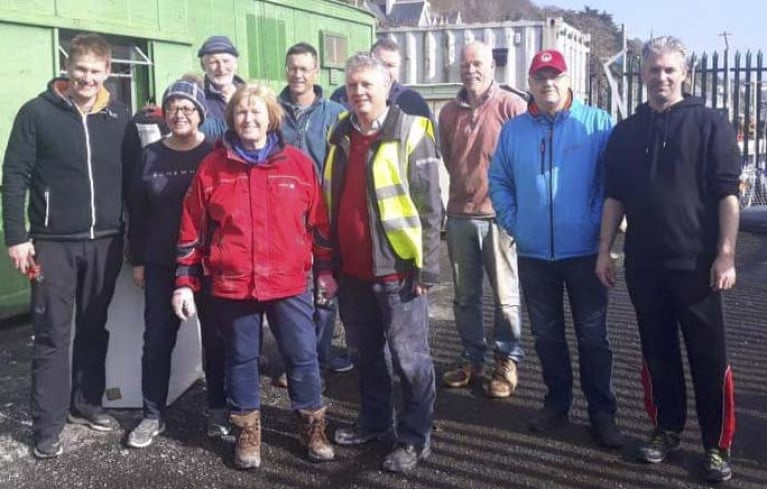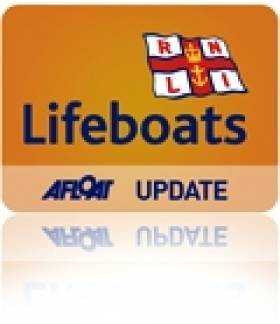Displaying items by tag: Great Island
One Less Sailing Club is Good News for Cork Harbour
Cork Harbour has lost a sailing club, which is actually good news for the sport.
If that seems questionable statement, it is not because it brings back together the members of Cove Sailing Club and the Great Island Sailing Club, after a split over ‘differences of attitude and opinion’ as they were described, which occurred due to difficulties in the development of the club’s marina at Whitepoint, just outside the town.
As a result, members who left Cove SC in 2018 set up Great Island Sailing Club to protect and continue, they said, sailing in Cobh. (The club name is spelt differently from the town name).
As the marina project as being progressing satisfactorily and now installation is underway, negotiations between the clubs have been going on. With a positive outcome, Great Island Sailing Club held an EGM to discuss re-joining Cove Sailing Club and a motion to do so was passed unanimously.
“We are looking forward to having a stronger bigger club in Cork Harbour and are very excited with plans for the 2020 season,” said Johanna Murphy, GISC’s Commodore. She confirmed that GISC no longer exists and its members have rejoined Cove SC.
A joint statement from the two clubs said that Cove SC, which celebrated its centenary last year, will continue the Cork Harbour Combined League, which GISC was instrumental in initiating for Cruisers along with the RCYC and Monkstown Bay SC. The Cork Harbour to Dunmore East Race, which was inaugurated last year, will be run by Cove SC at the end of May. It will also be running club events such as the Cove at Home, Cobh People’s Regatta and the Cobh to Blackrock Race.
“The rejuvenated evening dinghy racing will continue this year on Wednesdays throughout the summer as well as the continuation of junior dinghy training. We are also pleased to be hosting the finish of the Dun Laoghaire to Cobh Race (formerly known as the Kingstown-to-Queenstown Race) in association with the National Yacht Club,” said the statement.
Johanna Murphy will continue as Commodore of the South Coast Offshore Racing Association. She is also a member of the Irish Cruiser Racing Association’s board and has been appointed to the Cruiser committee of Cove SC.
On my podcast this week I’m joined by Damian Ahern from Cove Sailing Club’s Committee and who is also a member of their Asset Management Team which is overseeing the new marina installation and other projects within the club. We discuss these developments.
• Listen to the Podcast below.
Dream Home at Water's Edge on Great Island
#WATERFRONT PROPERTY - A beautifully restored period house on 14 acres of Great Island in Co Cork could be a dream home for any big spender.
Accepting offers over €3 million, the house at East Grove believed to date from the early 19th century and is constructed of stone under a slate roof, with attractive shallow gables.
Approached via a long wooded avenue, the house commands a magnificent position overlooking a peaceful inlet of Cork Harbour.
Accommodation comprises five reception rooms, including a drawing room, dining room and library; six bedrooms including a master bedroom with ensuite; and a fully fitted kitchen with black granite countertops and pantry.
Outside there is a courtyard with stables, a work shop and storerooms, as well as a one-bedroom apartment arranged on two floors, while further accommodation is available in the two-bedroom gate lodge with its own gardens.
Other amenities include a delightful walled garden, an indoor swimming pool, tennis courts and a boathouse with private harbour and boat slipway with a floating yacht pontoon and moorings.
Viewing of East Grove is strictly by appointment only with joint agents Knight Frank and Dominic Daly. More on the property is available HERE.
Five Incidents in Four Days for Cork Harbour Lifeboat
Crosshaven Volunteer RNLI Lifeboat has had a very busy few days as they were tasked to five incidents in four days.
On Thursday evening at 17.59, the Lifeboat was tasked to the upper reaches of Cork Harbour near the city to check out an unidentifiable object in the water. On arrival, the object was found to be a large bag containing foam. Friday evening, saw the Lifeboat heading up the Owenabue River to rescue two punts which had been floated off on the very high Spring tides and were perceived a danger to shipping.
Saturday evening at 20.34, the Lifeboat was again tasked to the North side of Great Island where a 55' Motor Launch with 3 persons on board had mechanical difficulties and drifting in high winds of force 7. On arrival at scene, the crew decided that because of the size and weight of the vessel and the high winds it was safer to anchor the vessel and take off the crew. They were safely landed at East Ferry Pier. As the Lifeboat was returning to Crosshaven, The Coastguard at Valentia again tasked the Lifeboat to search the area between Cobh and Monkstown for an overdue Rigid Inflatable Boat (RIB). After searching for a period, and with nothing found, the Coastguard stood down the volunteer Lifeboat crew to return to station.
Sunday afternoon, and the pagers were again activated at 16.33 to go to the aid of a small boat with engine problems at East Ferry. On arrival in the area, it was noticed that the casualty boat had managed to restart and head into East Ferry Marina.
Related Safety posts
RNLI Lifeboats in Ireland
Safety News
Rescue News from RNLI Lifeboats in Ireland
Coast Guard News from Ireland
Water Safety News from Ireland
Marine Casualty Investigation Board News
Marine Warnings
































































